A game for math. Verbal counting
Just think, we live in a wonderful era, invented computers, forgot how to use mechanical scheduling, every second person in his pocket has a powerful computer, a couple of generations have already grown with handheld calculators, elementary calculations are becoming less and less common. How long have you had to count in your mind? Well, let's say, why not add up a couple of four or five-digit numbers while shopping, then give the cashier money to the nearest penny? You say all this nonsense, a waste of time. Who is empty, who is not empty. I believe that, firstly, to maintain the functionality of the brain, it is necessary to periodically use this remarkable functionality, and, secondly, the art of succeeding in basic skills makes a person a master.
So let's get started. What could be the most fundamental knowledge for a mathematician? Perhaps this is what we teach children in first grade or even in kindergarten, the summation of integers. So, meet the game that trains the performance of the brain in the simplest arithmetic:
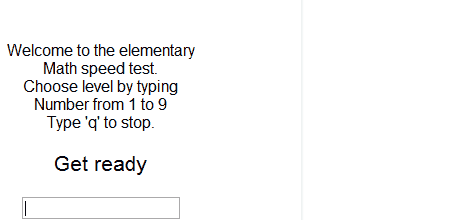
Well, right there, everything relies on a reaction and a blind set of numbers.
Well, folding single digits is boring and useless, you say. I completely agree, more than half of the measurement is the reaction time and hits on the keys, which will get boring in a few minutes. Well, then we enter a deuce at the start and get to the second level.
')
But it all started with the fact that I was looking for the perfect web page where you can test your oral account abilities without registering and SMS. I found different ones, but everywhere I lacked trifles. For example, to press Enter each time is an excess and waste of such precious time! But you can write this with a couple of lines of JavaScript, I thought, and wrote the first web page. Time passed, my friends and I tested, admired, and shared the results, and by that time I reached the summation of 6-digit numbers, having the results of 10-15 seconds per pair. In order to have an incentive to grow, based on his experience, he made a rating plate. Ready to become a master of arithmetic? Ready to compete against your yesterday's result? Well, take a look at this simple minimalist interface. Note the change in rank:
Now, if you want to face off with the speed of neural networks, then you now have the rank, calculated by the best ten attempts, as well as the number of digits of the addendum numbers. Here, for example, looks like the execution of the "master" for three-digit numbers:
So, when I summed up the 5, 6-digit numbers, I noticed that since for Europeans (or rather all non-Arabs), the perception of a number goes from left to right, and more importantly, that the input of numbers is also left to right, a natural desire arises first sum up the leading digits, and only then the lower digits, in order to enter the result in the course of the calculation. For those involved in computer science olympiads, such a long arithmetic problem can be familiar - to sum up the numbers supplied from the standard input one by one without buffering. Now the same thing, only for our brains, the addition of n-digit numbers from left to right:
Anyone can try their hand at conventional summation , as well as Fun with BigNum .
Records of summation of many-valued numbers share in the comments
Since you can improve and refine forever, you can reject it here
UPD
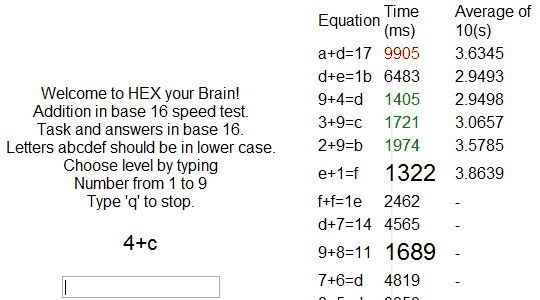
Now also in hexadecimal
UPD2
Now the top ten are saved in localStorage. Thanks for the advice dotneter
As well as symmetrical ternary numeral system with the alphabet {i, 0, 1} from NyanOmich
So let's get started. What could be the most fundamental knowledge for a mathematician? Perhaps this is what we teach children in first grade or even in kindergarten, the summation of integers. So, meet the game that trains the performance of the brain in the simplest arithmetic:

Well, right there, everything relies on a reaction and a blind set of numbers.
Well, folding single digits is boring and useless, you say. I completely agree, more than half of the measurement is the reaction time and hits on the keys, which will get boring in a few minutes. Well, then we enter a deuce at the start and get to the second level.
')
Addition of two-digit numbers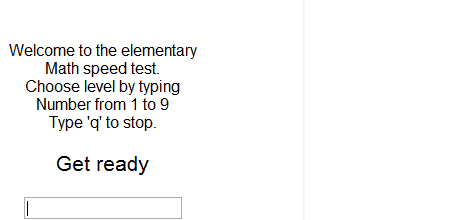

But it all started with the fact that I was looking for the perfect web page where you can test your oral account abilities without registering and SMS. I found different ones, but everywhere I lacked trifles. For example, to press Enter each time is an excess and waste of such precious time! But you can write this with a couple of lines of JavaScript, I thought, and wrote the first web page. Time passed, my friends and I tested, admired, and shared the results, and by that time I reached the summation of 6-digit numbers, having the results of 10-15 seconds per pair. In order to have an incentive to grow, based on his experience, he made a rating plate. Ready to become a master of arithmetic? Ready to compete against your yesterday's result? Well, take a look at this simple minimalist interface. Note the change in rank:
Slow animation to demonstrate rank system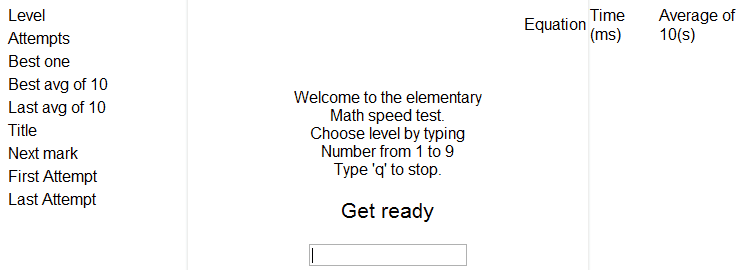

Now, if you want to face off with the speed of neural networks, then you now have the rank, calculated by the best ten attempts, as well as the number of digits of the addendum numbers. Here, for example, looks like the execution of the "master" for three-digit numbers:
Addition of three-digit numbers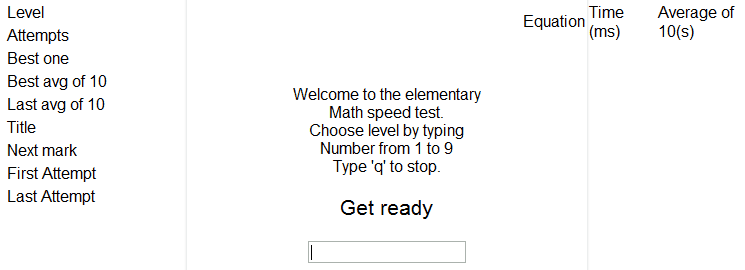

So, when I summed up the 5, 6-digit numbers, I noticed that since for Europeans (or rather all non-Arabs), the perception of a number goes from left to right, and more importantly, that the input of numbers is also left to right, a natural desire arises first sum up the leading digits, and only then the lower digits, in order to enter the result in the course of the calculation. For those involved in computer science olympiads, such a long arithmetic problem can be familiar - to sum up the numbers supplied from the standard input one by one without buffering. Now the same thing, only for our brains, the addition of n-digit numbers from left to right:
Bignum

Anyone can try their hand at conventional summation , as well as Fun with BigNum .
Records of summation of many-valued numbers share in the comments
Hidden text
starting with three-digit numbers
Since you can improve and refine forever, you can reject it here
UPD

Now also in hexadecimal
UPD2
Now the top ten are saved in localStorage. Thanks for the advice dotneter
As well as symmetrical ternary numeral system with the alphabet {i, 0, 1} from NyanOmich
Source: https://habr.com/ru/post/271065/
All Articles